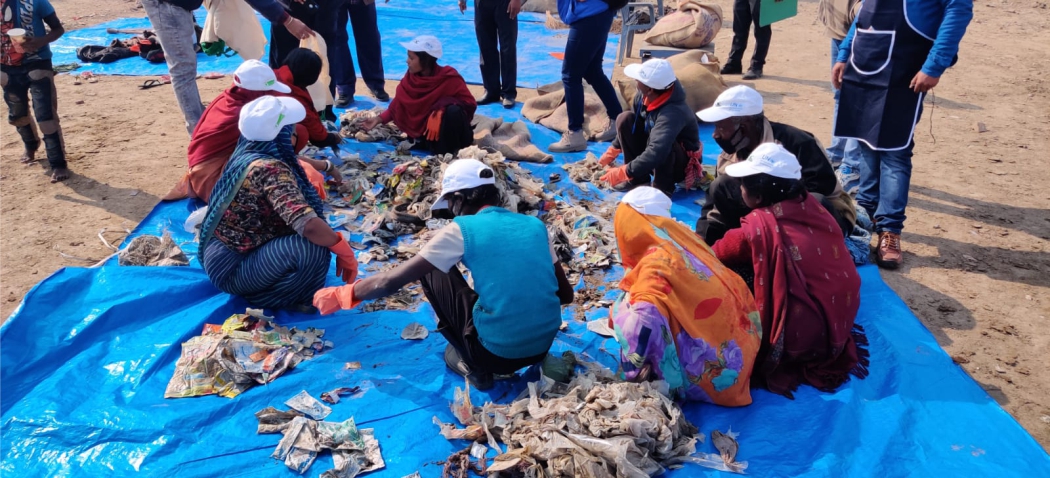|
Introduction
Considering the advantages and disadvantages of plastics, it can be safely said that adopting the strategies of the circular economy in terms of reuse, reduction, recycling, recovery and responsible disposal (together termed as R-behaviours) offer immense opportunity in improving and effectively managing the plastic waste systems. Plastics can be more of a protector than only a pollutant provided it is managed and disposed of properly and their leakage into the environment is prevented. From the implementation perspective, this would require an enabling ecosystem that fosters disruption and innovation. The 4Rs of Behavioural Change
Identifying effective behaviour change and
addressing concerns related to it are very important in finding
ground-breaking solutions to large-scale pertaining issues. Strong
evidence exists that proves behaviour changes through different means
provide an opportunity to address the challenges of sustainability. A
recent example is the outbreak of the COVID-19 pandemic where the world
saw, first-hand, the impact of large-scale behaviour change at an
unprecedented rate. Out of urgency and necessity, people quickly adopted
a range of new and different behaviours that helped in slowing the
spread of the COVID-19 virus. Wearing masks, maintaining social
distance, and getting vaccinated were all important behaviour changes
that helped in controlling and reducing the spread of the virus. In spite of its power and relevance in creating mass-level impact, behavioural change is the least researched topic today when it comes to plastic waste management. Many examples exist that inform how consumers are the drivers of new trends in the market and key stakeholders in achieving sustainable consumption. Even with such hard evidence, most of the research today focuses on the production side of the circular economy and very few dwell on consumersí perspective on the circular economy strategy for reducing waste.
A more circular economy in plastics can be
achieved when the existing gap in behavioural interventions is bridged
and consumersí perspectives on factors that act as motivators, provide
opportunities and help reinforce and maintain consumption that aligns
with circular economy principles are explored. An understanding needs to
be built of what can bring about behavioural change for different
stakeholders and driven by R-behaviours. R-behaviours among the
consumers at the level of purchase, use and disposal can be
achieved by promoting initiatives and programmes at three levels (Figure
1):
In other words, materials refer to the technologies, tools, infrastructure, or material objects required in performing the practice. Competencies refer to the skills or knowledge needed to carry out the practice. Lastly, meanings refer to the values, social norms, attitudes, feelings and symbolic meanings associated with the practice. These three factors contribute to the behaviours of individuals within a social system, which in combination can support a cultural shift towards increased plastic circularity in India and worldwide. A Circular Economy for a Sustainable Environment As plastic waste grows relentlessly, adopting a circular economy approach is central to achieving the vision of a sustainable environment. There is a need for action research that can develop frameworks to understand different motivators, drivers, barriers and enablers from a consumerís perspective at the levels of materials, meanings and knowledge. These factors can address gaps and promote future behaviour change strategies to encourage the circular plastics economy in India.
References
Aakriti Uttam
|
 A
study by the Ellen MacArthur Foundation estimates that if the current
scenario continues then by 2050 the amount of plastic in seas and oceans
across the world will weigh more than the fish by weight. Despite
plastic pollution being a burning issue, we are all cognizant of the
fact that plastic is a unique material that is cheap, versatile,
lightweight, resistant and offers many functionalities. It plays a
critical role in maintaining food quality and safety and reducing food
waste. The trade-offs between plastics and substitutes (or complete
bans) are therefore complex and could create negative knock-on impacts
on the environment.
A
study by the Ellen MacArthur Foundation estimates that if the current
scenario continues then by 2050 the amount of plastic in seas and oceans
across the world will weigh more than the fish by weight. Despite
plastic pollution being a burning issue, we are all cognizant of the
fact that plastic is a unique material that is cheap, versatile,
lightweight, resistant and offers many functionalities. It plays a
critical role in maintaining food quality and safety and reducing food
waste. The trade-offs between plastics and substitutes (or complete
bans) are therefore complex and could create negative knock-on impacts
on the environment.
